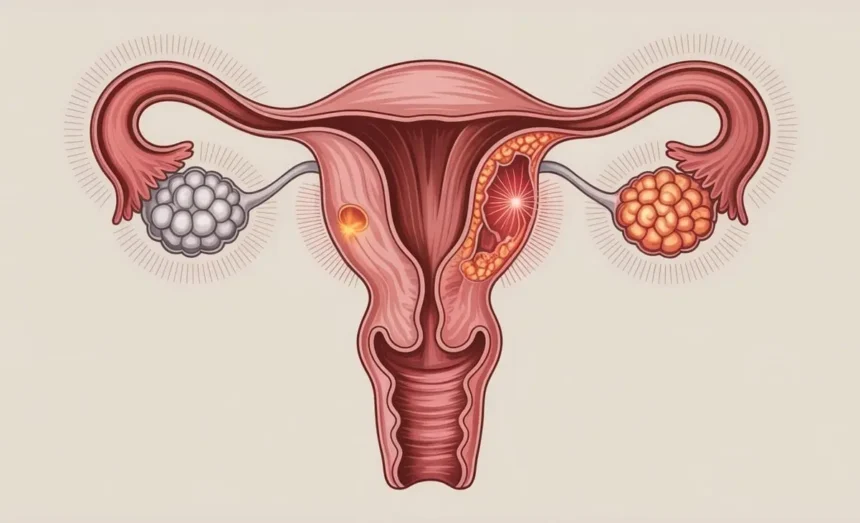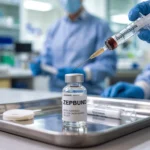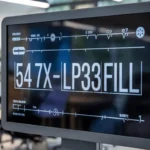Endometriosis is a disorder in which tissue similar to the uterine lining grows outside the uterus, often on the ovaries or other pelvic organs. These tissues respond to hormonal cycles and can bleed during menstruation, leading to inflammation and scar tissue formation. Common symptoms include pelvic pain, painful periods, and discomfort during intercourse or bowel movements, while less common symptoms include fatigue, digestive issues, or infertility. Here is more information about the uncommon symptoms of endometriosis:
Lower Back or Pelvic Pain
When you sit down or bend and feel pain in your back, it may be a sign of endometriosis. This pain can continue even outside of your menstrual periods without any clear explanation. Some people experience pain in the pelvic region that radiates to the thighs or hips, creating a sense of heaviness. This discomfort is often mistaken for muscle fatigue after long periods of walking or standing. Although the pain might appear cyclical, it does not always align exactly with the menstrual cycle.
Pain in the lower back also increases with exercise or stretching, especially during activities like jogging or yoga. Core exercises can sometimes worsen the pain, which may persist for several hours. When the pain feels deeper or more intense than typical muscle soreness, it might indicate underlying issues related to the reproductive organs.
Over-the-counter painkillers often provide only slight or temporary relief. Heating pads sometimes help, but the pain often returns and tends to become long-term. The pain also becomes more noticeable during ovulation or times of emotional stress.
Digestive Issues
Endometriosis patients can experience nausea and bloating as menstruation approaches. This abdominal discomfort often begins a few days before the period and may worsen during menstruation. The pain can occur when endometrial-like tissue irritates or affects the intestines, leading to inflammation and digestive upset. Some individuals also experience alternating constipation and diarrhea around their period. Others may have sudden stomach cramps that resemble food poisoning.
Altered Menstrual Patterns
Light brown discharge can sometimes occur between menstrual cycles, even without any changes in lifestyle. This spotting signals variations in menstrual flow, such as periods that are slightly longer, shorter, or lighter than usual. Although hormonal levels and blood tests may appear normal, endometriosis can still present with unusually heavy or thick menstrual flow. Some individuals notice that their menstrual blood contains clots or appears suddenly, without an obvious cause. Hormone testing may show balanced results, yet irregular spotting or discharge persists. In certain cases, endometriosis is associated with early or unexpected bleeding, which makes cycle tracking and fertility planning more difficult.
Unexplained Infertility
If you are having conception problems where pregnancy tests remain negative but ultrasound scans show a normal uterus, the issue may be endometriosis. This usually happens when there is interference with embryo implantation by the endometrial tissue. You may choose to undergo various fertility procedures, but in some cases, early pregnancy loss can occur. Repeated miscarriages are sometimes associated with inflammation that affects egg quality and sperm motility.
Bladder or Bowel Pain
Painful urination is one of the uncommon symptoms of endometriosis and is not always related to a urinary infection. Pain may also occur during bowel movements, even when medical tests show no other underlying conditions. Some individuals experience a frequent urge to urinate or a sensation of bladder fullness, despite passing only small amounts of urine. These symptoms often worsen during menstruation, when endometrial-like tissue becomes inflamed and swollen.
Endometriosis pain sometimes resembles symptoms of irritable bowel syndrome or constipation, including cramping and bloating. Inflammation caused by endometrial lesions may contribute to abdominal swelling and discomfort, often referred to as “endo belly.” Although dietary adjustments, such as eating smaller, balanced meals and staying well-hydrated, help ease bloating, they do not address the underlying condition. Bowel and bladder pain also intensify during sexual activity, especially when endometriosis affects nearby organs.
Treating the Uncommon Symptoms of Endometriosis
If you notice any of these uncommon symptoms, schedule an appointment with your healthcare provider. This will allow you to potentially identify and treat the issue before it escalates. Your doctor will recommend treatments like lifestyle modifications, hormone therapy, or surgery. Find an endometriosis expert in your area today to learn more about this condition.







